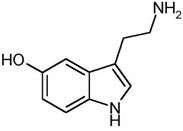The Happiness
- Tomás Morales y Durán

- Mar 21, 2023
- 4 min read

Copyright © 2023 Tomás Morales Duran. All rights reserved
Serotonin, known as the "happiness hormone" since it largely determines our mood and control of emotions, is a molecule synthesized by neurons of the central nervous system that has a role both as a hormone and as a neurotransmitter, since it is capable of both flowing through the blood, modifying the physiology of different organs and tissues, and regulating the activity of the nervous system, respectively. Serotonin is naturally produced in our brain with the aim of ensuring that our physiology, vital functions and emotions are consistent with the changes we experience in the environment, both due to its own effects and the incidence it has on the synthesis of others. neurotransmitters. In this sense, serotonin fulfills many different functions, having an impact on body temperature, appetite, cell division, the health of the cardiovascular system, sleep cycles, and cognitive functions.
An important aspect to mention about this neurotransmitter and hormone is that to synthesize it, the brain needs tryptophan, an essential amino acid that the body is not capable of producing on its own, but must come from the diet. Rice, capomo, bananas, eggs, pasta, legumes or chicken are foods rich in tryptophan.
Serotonin is a neurotransmitter monoamine.

Serotonin (5-HT) is synthesized in serotonergic neurons of the central nervous system and in enterochromaffin cells of the gastrointestinal tract. At the brain level, the neurons of the raphe nucleus, a cellular aggregate that forms the medial column of the brain stem, constitute the epicenter of 5-HT production.
Serotonin is synthesized through L-Tryptophan, an essential amino acid in two phases. The first reaction, catalyzed by the enzyme tryptophan hydroxylase, converts tryptophan to 5-hydroxytryptophan. In the second reaction, 5-hydroxytryptophan is decarboxylated into 5-hydroxytryptamine, which is also called serotonin. The enzyme that catalyzes the reaction is 5-hydroxytryptophan decarboxylase.
Serotonin is much more than the "happiness hormone." It is one of the molecules that has the greatest influence on more physiological and emotional processes in our body since it controls the synthesis and release of other neurotransmitters. Serotonin is more or less directly involved in a large number of biological functions, once produced and released.
Serotonin participates in regulating a multitude of functions of our body at the brain level, in the digestive tract, in the arteries or in platelets. In general, serotonin helps regulate brain activity in relation to attention, memory, mood, appetite, sexual desire or body temperature, and some studies have shown that it increases brain plasticity and accelerates the learning.
An interesting serotonin agonist is ergot produced by the fungus Claviceps purpurea that grows on rye and other grains. The pharmacological effects of ergot alkaloids are varied and complex; in general, their effects are due to their actions as partial agonists or antagonists of serotonergic, dopaminergic, and adrenergic receptors. This is a very interesting effect for the ultimate liberation from the addiction to happiness.
Alcohol is totally discouraged. Alcohol acts mainly on molecules of a protein nature such as the receptors of the neurotransmission system. Once alcohol reaches the brain, it intervenes in the different neurotransmission systems, establishing a complex and in many aspects unknown relationship, since it does not affect one specifically, but rather its action reaches many neurotransmitters in a different way. The consumption of alcohol causes the brain to make adaptive changes, which overwhelm the neurotransmission mechanisms, because when the stimulus persists, it goes from a balance in physiological conditions to forcing it to activate molecular processes in order to maintain this new balance that has shifted from the physiological to the pathological. In alcohol addiction, an abnormal adaptation of the brain occurs. In this phase, the ethanol that initially brought pleasure, when withdrawn, produces a withdrawal syndrome. The need for alcohol to maintain this "new balance" indicates that the neurotransmission systems have been altered. Among the various effects that alcohol consumption has on serotonin, the most important are its ability to cause neurological and immune problems, increased use and susceptibility to alcohol dependence, and risk of intoxication and addiction.
Alcohol causes an excessive increase in serotonin in the brain. In addition, when alcohol consumption becomes continuous and prolonged, its effect changes, generating a greater demand for serotonin in the brain. In this way, it contributes to increasing addiction and depressive symptoms.
The following exercise affects the production and release of this neurotransmitter.
During the performance of this exercise it is necessary to maintain the Duchenne smile established, essential to start the process. The way in which the mind will be directed is given by the "happiness formula":

The abscissa axis represents the time in seconds. The ordinate axis is the amount of air inside:

The zero value represents the rest state. The ups are inhalations and the downs are exhalations. The pressure in this case is strong and remains constant at each and every moment.
This perspective is from outside. It is not used seeing it like this. The mind is placed within the same plane of the curve and on it and remains connected along the shape by going up and down at constant speed and pressure, continuously and indefinitely until enough serotonin and its substances have been released. effects are visible.
Don't forget to always smile.
Happiness is like a horseback ride through the mountains, you take the reins and carry them through your breath; on each inhalation you climb steadily towards the top, upon arrival your lungs are full of air, you begin to exhale as you descend only to prepare to climb back up and back down again, you hold the reins but can feel the gallop becoming more and more stronger and faster, even so, you hold it with your breath, you realize that the air is not just in front of you, it surrounds you, envelops you, there is no longer any difference between you and the horse, you are one, the sensations are increasing and even so you hold the reins, until the horse's legs come off the ground, it rises, it flies, that's when you let go of the reins and you dissolve into a happiness that you have never experienced before.





Comments